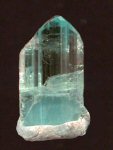Euclase Mineral Data
General Euclase Information
Chemical Formula: BeAlSiO4(OH)
Composition: Molecular Weight = 145.08 gm
Beryllium 6.21 % Be 17.24 % BeO
Aluminum 18.60 % Al 35.14 % Al2 O3
Silicon 19.36 % Si 41.41 % SiO2
Hydrogen 0.69 % H 6.21 % H2 O
Oxygen 55.14 % O
______ ______
100.00 % 100.00 % = TOTAL OXIDE
Empirical Formula: BeAl(SiO4 )(OH)
Environment: Hydrothermal, pegmatitic, and alluvial rocks.
IMA Status: Valid Species (Pre-IMA) 1792
Locality: Orenburg district in the southern Urals, Russia. Link to MinDat.org Location Data.
Name Origin: From the Greek eu - "well" and klasis - "breaking."
Name Pronunciation: Euclase
Synonym: ICSD 202094
PDF 14-65
Euclase Image
Images:
Euclase
Comments: Euclase with sharp edges and great color. This specimen is from one of the famous and finest world finds of euclase, in the Colombian Emeralds area.Location: Chivor, Columbia.
Scale: 1.2 x 0.6 cm.© Fabre Minerals
Euclase Crystallography
Axial Ratios: a:b:c =0.3333:1:0.3231
Cell Dimensions: a = 4.763, b = 14.29, c = 4.618, Z = 4; beta = 100.3° V = 309.25 Den(Calc)= 3.12
Crystal System: Monoclinic - Prismatic 1 /a
X Ray Diffraction: By Intensity(I/Io ): 7.15(1), 3.219(0.5), 3.836(0.35),
Physical Properties of Euclase
Cleavage: {010} Perfect
Color: Blue, Colorless, White, Light blue, Light green.
Density: 2.987 - 3.1, Average = 3.04
Diaphaneity: Transparent to translucent
Fracture: Brittle - Generally displayed by glasses and most non-metallic minerals.
Habit: Massive - Fibrous - Distinctly fibrous fine-grained forms.
Habit: Prismatic - Crystals Shaped like Slender Prisms (e.g. tourmaline).
Habit: Striated - Parallel lines on crystal surface or cleavage face.
Hardness: 7.5 - Garnet
Luminescence: Non-fluorescent.
Luster: Vitreous (Glassy)
Streak: white
Optical Properties of Euclase
Gladstone-Dale: CI meas = 0.021 (Excellent) - where the CI = (1-KPDmeas /KC ) calc = 0.045 (Good) - where the CI = (1-KPDcalc /KC )PDcalc = 0.2113,KPDmeas = 0.2166,KC = 0.2214
Optical Data: Biaxial (+), a=1.652, b=1.655, g=1.671, bire=0.0190, 2V(Calc)=48, 2V(Meas)=50. Dispersion none.
Pleochroism (x): colorless.
Pleochroism (y): colorless.
Calculated Properties of Euclase
Electron Density: Bulk Density (Electron Density)=3.02 gm/cc
Fermion Index: Fermion Index = 0.07
Photoelectric: PEEuclase = 1.36 barns/electronU=PEEuclase x r Electron Density= 4.11 barns/cc.
Radioactivity: GRapi = 0 (Gamma Ray American Petroleum Institute Units)Not Radioactive
Euclase Classification
Dana Class: 52.02.01.01 (52) Nesosilicate Insular SiO4 Groups and O, OH, F, and H2O
(52.02) with cations in [4] and >[4] coordination
(52.02.01) Euclase group
52.02.01.01 Euclase BeAlSiO4(OH) P 21 /a 2/m
52.02.01.02 Clinohedrite CaZnSiO4•(H2O) Aa m
52.02.01.03 Hodgkinsonite MnZn2SiO4(OH)2 P 21 /c 2/m
52.02.01.04 Gerstmannite (Mg,Mn)2ZnSiO4(OH)2 Bbam 2/m 2/m 2/m
Strunz Class: 09.AE.10 09 - SILICATES (Germanates)
09.A - Nesosilicates
09.AE -Nesosilicates with additional (O,OH,F,H2O);
09.AE.10 Euclase BeAlSiO4(OH) P 21 /a 2/m
Other Euclase Information
See Also: Links to other databases for Euclase : Am. Min. Crystal Structure Database Amethyst Galleries' Mineral Gallery Athena CalTech Mineral Spectroscopy EUROmin Project Ecole des Mines de Paris GeoScienceWorld Google Images Google Scholar Handbook of Mineralogy (MinSocAm) Handbook of Mineralogy (UofA) MinDAT Mineralienatlas (Deutsch) Online Mineral Museum Philatelic Mineralogy QUT Mineral Atlas Ruff.Info Scandinavian mineral gallery Tradeshop.com - The Rainbow of Gems WWW-MINCRYST Search for Euclase using:
[AOL ]
[Bing ]
[Dog Pile ]
[GeoScienceWorld ]
[HotBot ]
[Ixquick ]
[Lycos ]
[MAMMA ]
[Scirus ]
[Teoma ]
[WebCrawler ]
[Wikipedia ]
[YAHOO ]
Visit our Advertisers for Euclase :
Ask about Euclase here : Ask-A-Mineralogist from the Mineralogical Society of AmericaMindat.org's Discussion GroupsOriginal Rockhounds Discussion GroupRockhounds Discussion Group on Yahoo GroupsMineral Discussion Forum from Fabre Minerals - also available in
Espaņol
Print or Cut-and-Paste your Euclase Specimen Label here :
Euclase
BeAlSiO4(OH) Dana No: 52.02.01.01 Strunz No: 09.AE.10 Locality:
Notes:
Dakota Matrix
Excalibur Minerals
Exceptional Minerals
Hudson Insitute
John Betts Fine Minerals
Mc Dougall Minerals
Mineral News
Rock and Mineral Shows
Weinrich Minerals, Inc.


